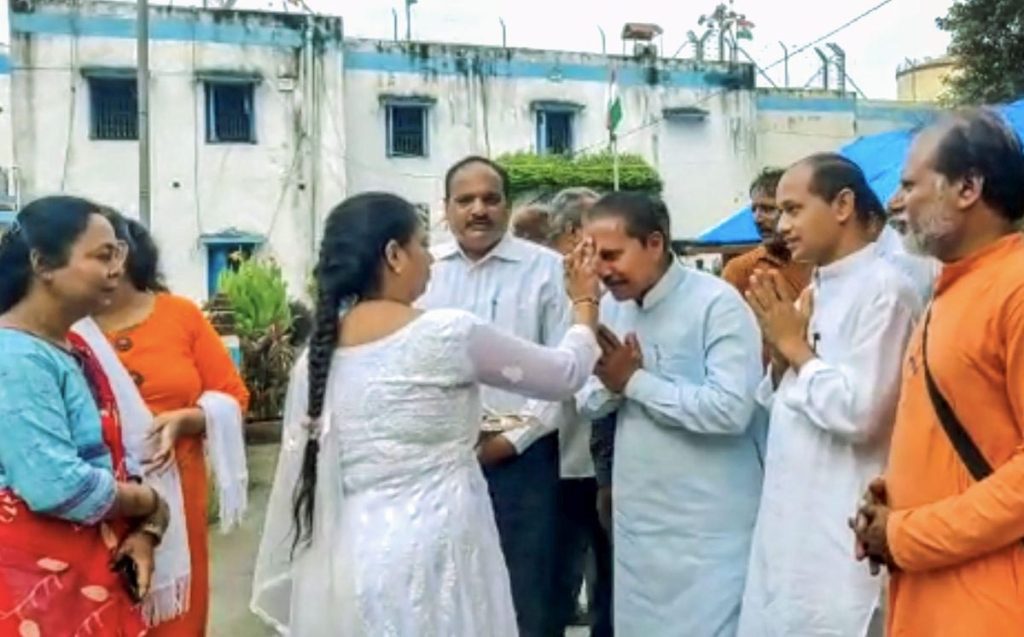While cancelling the remission of 11 convicts in Bilkis Bano gangrape case, the Supreme Court ordered them to surrender within two weeks even as it came down heavily on the Gujarat government for ‘acting in tandem’ with the convicts. A report by Mudit Mathur

In a landmark judgement, the Supreme Court has set aside the remission of 11 convicts sentenced to life imprisonment for multiple murders and gang rapes, including that of Bilkis Bano, during the 2002 communal riots in Gujarat. The apex court directed the convicts, who were given premature release in August 2022, to surrender to the prison authorities within two weeks.
The court also declared its May 2022 judgement delivered by a bench comprising Justices Ajay Rastogi and Vikram Nath, which had directed the Gujarat Government to consider the remission applications of the convicts as a nullity since the petitioner (one of the convicts Respondent no. 3 – Radheshyam Shah) was found to have “played fraud” by misrepresenting and suppressing relevant facts before the court. It was also found to be per incuriam (lack of due regard to the law or the facts) for ignoring precedents and the statutory mandate.

The court held that the State of Gujarat was not the “appropriate government” to decide the issue of remission as the trial was held in the State of Maharashtra. Since the Gujarat Government was found to be incompetent, the remission orders were held to be invalid. After an 11-day-long hearing that began in August 2023, a division bench of Justices BV Nagarathna and Ujjal Bhuyan had reserved its judgment on October 12, 2023.
Directing the convicts to be sent back to jail, Justice Nagarathna said, “If the convicts can circumvent the consequences of their conviction, the peace and tranquillity in the society will be reduced to a chimaera. The courts have to be mindful not just to the spelling of justice but also the content of it. It is the duty of this court to correct arbitrary orders at the earliest and to retain the foundation of trust of the public.”
The court held, “The Respondent No. 3 played fraud on this court. The Gujarat High Court’s order could not have been challenged in a writ petition, nor could it have been set aside in writ proceedings. Hence the said order is a nullity and non-est in law. Consequently, the May 2022 order is hit by fraud and is a nullity. It cannot be given effect to. All proceedings pursuant to the said order are vitiated. This judgment is also “per incuriam” as it refused to follow the binding proposition of law that had been settled long ago by a nine-Judge bench decision of this Court in Naresh Shridhar Mirajkar vs. State of Maharashtra, AIR 1967 SC 1.
The apex court noted. “The Gujarat High Court while considering the submissions on criminal application of Shah challenging the non-consideration of his application for premature release under Sections 433 and 433A of the Code of Criminal Procedure, 1973 (“CrPC”), observed that Respondent No 3 herein had been tried in the State of Maharashtra, hence, as per Section 432 (7), the ‘appropriate government’ for the purpose of Sections 432 and 433 of the CrPC would be the State of Maharashtra.”
“We cannot forget the conduct of the convicts, particularly, the one who had abused the process of this court. The deprivation of liberty is justified inasmuch as they have been erroneously set at liberty. One cannot overlook the fact that they were in jail for a little over 14 years, with liberal paroles and furloughs. The status quo ante must be restored. Plea of protection of liberties of these convicts cannot be accepted by us. The rule of law must prevail. When the impugned orders are set aside, the consequences must follow.”
Quoting classical Greek philosopher Plato from “Trevor J. Saunders, Plato’s Penal Code: Tradition, Controversy, and Reform in Greek Penology, Oxford University Press, 1991,” Justice BV Nagarathna, who authored the 251-page judgement reversing the earlier judgment favouring remission to eleven convicts of such a grave crime, pronounced the relevant extracts of the judgement in open court along with Justice Ujjal Bhuyan stating that earlier order of the apex court was obtained by playing fraud with the court concealing material facts therein.
“Punishment is to be inflicted not for the sake of vengeance but for the sake of prevention and reformation. In his treatise, Plato reasons that the lawgiver, as far as he can, ought to imitate the doctor who does not apply his drug with a view to pain only, but to do the patient good. This curative theory of punishment likens penalty to medicine administered for the sake of the one being chastised. Thus, if a criminal is curable, he ought to be improved by education and other suitable arts and then set free as a better citizen and less of a burden to the State. This postulate lies at the heart of the policy of remission,” the court held.
“A woman deserves respect howsoever high or low she may be otherwise considered in society or to whatever faith she may follow or any creed she may belong to. Can heinous crimes, inter alia, against women permit remission of the convicts by a reduction in their sentence and by granting them liberty? These are the issues which arise in these writ petitions,” the bench proceeded with the matter with aforesaid philosophical preface as it examined these writ petitions, both on maintainability as well as on merits purely from a legal perspective.
The apex court judgement has come on the writ petitions assailing the orders dated 10.08.2022, granting remission and early release of respondent eleven convicts in Writ Petition (Crl.) No.491 of 2022 of Bilkis Yakub Rasool, (which was treated as the lead petition), who were all convicted, having been found guilty of committing heinous crimes during the large-scale riots in Gujarat on February 28, 2002 and a few days thereafter which occurred in the aftermath of the burning of the train incident in Godhra in the State of Gujarat on February 27, 2002.
Taking note of the incidents post Godhra, the Bench took note of the facts: “The grotesque and diabolical crime in question was driven by communal hatred and resulted in twelve convicts, amongst many Writ Petitions (Crl.) No.491 of 2022 Etc. Page 6 of 251 others, brutally gang-raping the petitioner in Writ Petition (Crl.) No.491 of 2022, namely, Bilkis Yakub Rasool, who was pregnant at that time. Further, the petitioner’s mother was gang raped and murdered, her cousin who had just delivered a baby was also gang raped and murdered. Eight minors including the petitioner’s cousin’s two-day-old infant were also murdered. The petitioner’s three-year-old daughter was murdered by smashing her head on a rock, her two minor brothers, two minor sisters, her phupha, phupi, mama (uncle, aunt and uncle, respectively) and three-cousins were all murdered. While eventually, the perpetrators of the crime, including the police personnel were convicted and sentenced, the petitioner, who was aged twenty-one years and pregnant at that time, having lost all members of her family in the diabolical and brutal attacks, has once again approached this Court seeking justice by challenging the en-masse remission granted to eleven convicts.”
Bilkis Yakub Rasool, being an unfortunate victim of the heinous crimes herein above narrated, filed the present writ petition under Article 32 of the Constitution of India, seeking issuance of a writ, order or direction quashing the orders dated 10.08.2022 passed by the State of Gujarat by which the convicts in Sessions Case No.634 of 2004, Mumbai (eleven convicts), whose convictions were upheld by a Division Bench of the Bombay High Court and thereafter by the Supreme Court, have been released prematurely.
Besides one of the victims, Bilkis Yakub Rasool, the action of Gujarat government was also challenged by women organizations–All India Democratic Women’s Association and National Federation of Indian Women (NFIW), an academic bureaucrat, Dr Meeran Chadha Borwankar, an independent journalist, Revati Laul, former and present parliamentarians including Subhashini Ali and Mahua Moitra, Roop Rekha Verma, former Vice-Chancellor of Lucknow University, and lawyer Asma Shafique Shaikh. The court left open to consider the question of maintainability of such Public Interest Litigation in criminal matters on the ground that one of the victims herself came before it seeking justice.
While answering the question of whether the impugned remission orders were in accordance with law, Justice Nagarathna said, “We need not have gone into the other issues. But for the sake of completion, we have.” Rule of law was breached because the Gujarat government usurped power not vested in it and abused its power. “The exercise of power by the State of Gujarat is an instance of usurpation of power and abuse of power. This is a classic case where the order of this court was used to violate the rule of law by granting remission. On that ground also, the remission orders deserve to be quashed,” the judge said. The court also criticised the Gujarat Government for not seeking review of the May 2022 judgment.
Advocate Shobha Gupta appeared for Bilkis, the rape survivor, while senior advocates Indira Jaising, and advocates Vrinda Grover, Aparna Bhat, Nizamuddin Pasha and Pratik R Bombarde represented various public interest litigants. Additional Solicitor-General SV Raju appeared for both the State of Gujarat and the Union of India. The convicts were represented by senior advocates Sidharth Luthra, Rishi Malhotra, S Guru Krishnakumar, advocate Sonia Mathur, and others.












